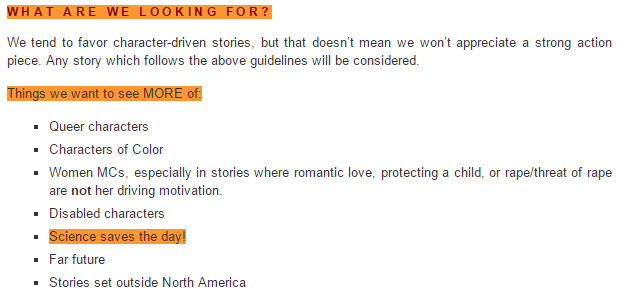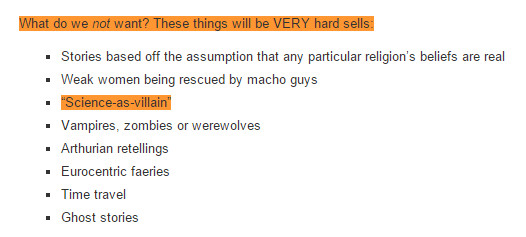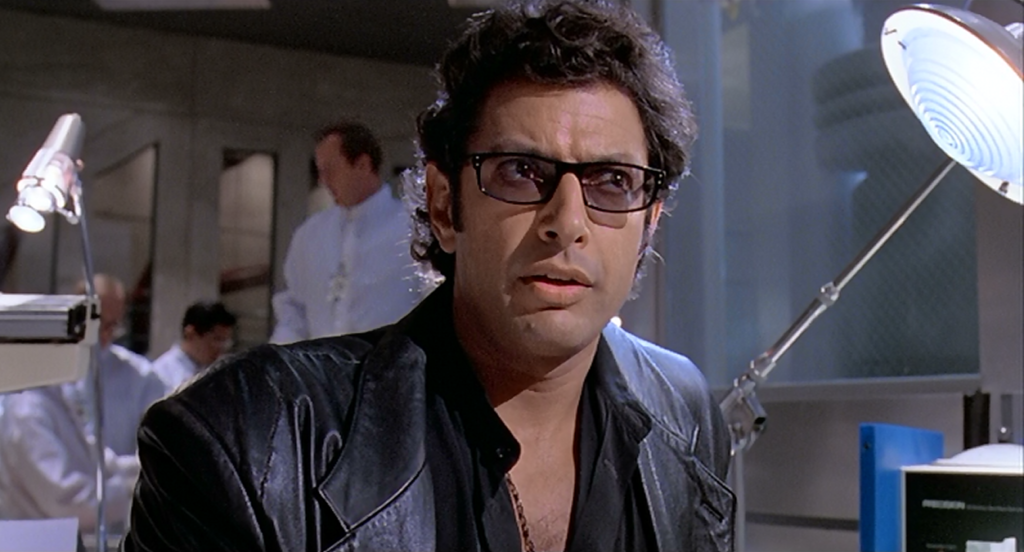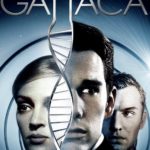No, Science Cannot Always Save The Day

“Your scientists were so preoccupied with whether or not they could that they didn’t stop to think if they should.”
Last week’s Tomorrowland article provides an excellent overview of Brad Bird’s sci-fi film contra its critics.1
Since then I’ve seen Tomorrowland myself and can confirm that some critics–not all–were critiquing the film for what it was trying to be, not about whether it succeeded in its own goals. At some point I may write a longer review of Tomorrowland and its themes of optimism and classical humanism. (After all, classical humanism with its regard for Christian virtues and the dignity of man is better than self-hating nihilistic humanism, but still can only approach the full Story.)
But first perhaps as an incidental counterpoint to last week’s article is this interesting conceit from CrossedGenres.com, a fantastical short-story mag.
Novelist Mike Duran points out2 one clause of the submissions guidelines.

Then comes the counterpart:

Of course, a few disclaimers:
- First Amendment rights include the right to practice religion and the right of free speech. Privately declining to endorse people’s practice of either right may violate the spirit of the First Amendment, but does not violate the actual right. Etc.
- To succeed, a publisher must in some sense give the majority of readers what they want.
- This publisher does not say they will never accept other stories, just that they will be “hard sells.”
- Nothing is wrong with emphasizing stories beyond the “mad science run amok” theme.
Yet Duran challenges the magazine’s desire to avoid “stories [that are] based [on] the assumption that any particular religion’s beliefs are real.” That desire, he notes, clashes amusingly with the insistence that “science” be the hero that wins almost every time.
For one, how do characters in a story NOT assume their beliefs are real? Is the Native American character to assume his religion is false? Is the Jedi to assume the Force is just made up? Isn’t this the same as saying that, We only want stories where ALL religion is assumed to be bunk? Or, We only want stories where ALL religions are assumed to be true (i.e., then none are)? The giveaway is that these editors DO NOT want stories where “Science is villain.” So “Science as Savior” stories are acceptable. Which elevates Science into the very realm of religious beliefs the mag doesn’t want.
Stories where Religion is true = bad.
Stories where Science is true = good.
Getting over old tropes is fine. Not every white-haired monocled German-accented genetic biologist in a white lab coat needs to cackle menacingly before throwing the lever.
But how does it help to make every scientist a righteous hero?
Isn’t this simply setting up another trope, and worse, a culturally insular and preachy trope?
Frankly this restriction sounds like it would result in boring, moralistic, self-righteous stories that would rank with some the worst of well-meant evangelical novels that place “doctrine” (e.g., a thoughtless and shallow repetition of truth) over story.
This restriction also disregards a long and righteous history of science fiction that has classically humanist (yet Christianity-derived) themes. In these stories, it is the heroic yet flawed protagonists — often scientists themselves! — who challenge others’ arrogance, often before, during, or after the consequences. Think of Jurassic Park (1993), Godzilla (2014), or pretty much any halfway-thoughtful story with large mutant monsters rampaging about and showing scientists they’re not all that.
Readers or publishers may tire of “science can be evil” stories, but humanity will always need them.
But the opposite notion does give rise to a potential plot outline that any of you aspiring fiction writers can have for free:
- German-accented mad scientist in white lab coat disregards test tubes, exotic mage materials, and remote-island volcano-based lairs.
- Instead the mad scientist acquires public-relations firms and speculative-story publications to persuade the public that Science is only ever the hero and Science must never be seen as any way destructive or negative.
- Doomsday scenario.
- True yet flawed and humble actual hero arrives to save the day.











































I dunno how I feel about maintaining the false dilemma of religion vs science. Why can’t we have both?
That’s another good point — that the folks running this story magazine seem to feel there is some kind of conflict between Science (good!) and Religion (bad!). My conclusion is that they are reluctant to admit their “science”-veneration is religion.
And I dunno about maintaining the ridiculous projection of “liking science is religion” hokum, either. It’s built out of the rhetorical device overused in sermons about how enjoying anything but Jesus is somehow religious competition to Jesus (which is pretty ridiculous in of itself, because that pretty much defines anything that holds your attention as “religion”). I would like to see some actual evidence to support this rather than skewed anecdata.
(Or the inverse worse, “religion” being defined as something that holds your attention? That would mean my crochet hobby is a religion. LOL, now I’m imagining a theological pissing match between natural-fiber-ists and acrylic-acceptionist, or between the difference factions of natural-fiber snobs: “Alpaca is morally superior!” “Sheep wool is traditional and sacred!” “Silk is heresy; it’s not even a hair fiber!”)
Lol, that would be funny, and you’re making me wish I could resume work on the afghan I started ages ago :p
When I hear people say that an ardent faith in science is a religion, I tend not to hear them say that simply when people like science(growing up I found science and documentaries fascinating, but no one called that religious or worship, for instance.). But I do tend to hear people use the term religion to refer to times when people put their faith and trust in science, thinking that it will eventually solve all problems, when they think it is all they need or attack people that have the slightest doubt about what some prominent scientists are saying at the time, etc. Whether or not people think solely following science, atheism, etc is truly a religion, there are many similar patterns between people that solely believe in science and solely believe in God that make it a little unreasonable to call a sole belief in science perfect.
The Science of Persuasion. This video is actually about common sense. But if it was called ‘Secrets my Dad taught me about getting my way’ people would be less persuaded. Put the word ‘Science’ in the title and people are gobbling it like they would chocolate chip cookies.